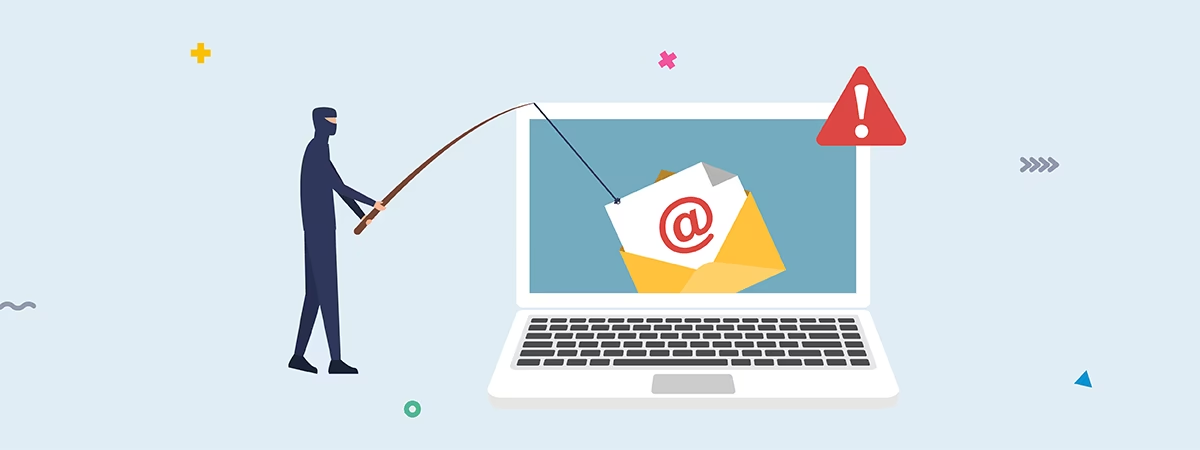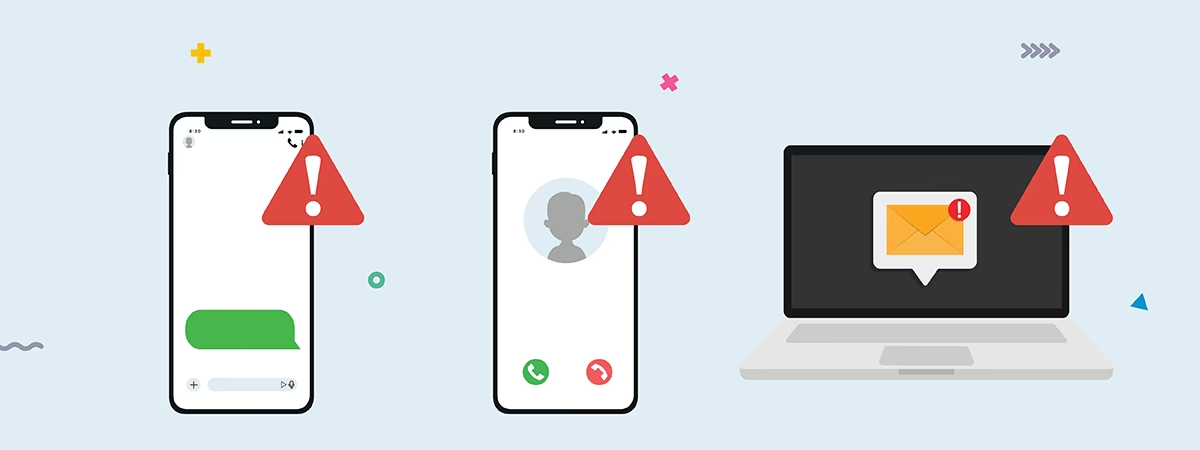To put it mildly, being scammed is a horrible experience. Depending on method and intent, you can lose your savings, your privacy, your sense of security – even your peace of mind.
In recent years, there’s been an uptick in the amount of scams targeting Australian consumers. In 2022 alone, Australians collectively lost a record $3.1 billion to scammers, and the numbers continue to rise.
Worse still, scams are getting harder and harder to spot. Gone are the days of janky emails and badly-spelled pop-up ads; scammers are taking advantage of recent technological advances to appear more convincing and legitimate than ever.
(Although the janky emails do still exist, come to think of it.)
But let’s stop focusing on the bad stuff. The good news is that there are a few things you can do to reduce your chances of getting conned. That’s why we’ve put together this article covering everything you need to know, including what to look out for, how to safeguard your information, and what to do if you (unfortunately) get scammed.
All aboard the security train, heading for safety station!
- What’s a scam?
- Where scams happen
- How to spot a scam
- Ways to protect yourself
- How to know it’s Hnry
- Hnry or Henry? Interactive quiz

What is a scam?
Great question!
Very basically, a scam is any scheme designed to trick people into handing over money, or personal information.
Scams come in a variety of different flavours, from the very basic to the mind-bogglingly complex. But the end goal is usually the same – making money quickly, leaving you footing the bill.
Kinds of scams people run include things like:
- Investment scams – persuading victims to invest money in an opportunity that doesn’t actually exist
- Fake products – you buy a new gizmo, and it never arrives
- Impersonation – they pretend to be a family/friend, and obtain personal info in conversation
- Phishing – like impersonation, only the scammer sends you an email pretending to be a trusted institution, like your bank. Or even the ATO.
- Romance scams – ah yes, the old “now we’re in love, can you pay off all my debt?” gambit.
This list doesn’t cover everything out there, but it’s a start. You get the idea. Basically, scammers play on your trust, and make the world a worse place for it.
💡 If you buy a product from a legitimate business, and it’s not what you expected, it’s probably disappointing, but might not be a scam. A scam is all about tricking you into giving something away for free – but a legitimate business will most likely try to solve your problem once you contact them.
Where scams happen
When we hear the word “scam”, we usually think of the old-school 90s email scam featuring a foreign prince who needs help moving money around (and has chosen you, a complete stranger from the other side of the world, to help him in his time of need!)
But while the fraudulent nature of these emails seems obvious in retrospect, modern-day scams can be a lot harder to spot. For starters, scammers are moving to systems and platforms where they can better blend in. A 2022 report by the Australian Competition and Consumer Commission (ACCC) discovered that more scams are perpetrated over text (33%), than over the phone (29%), or over email (22%). But this doesn’t mean we’ll all be safe if we throw away our phones and gmail accounts (ha!). Although only 6% of scams happened via social media, scammers were able to steal $80 million in total – more than via any other platform.
As for types of scams, the most expensive one out there in 2022 was the investment scam, where users were offered a unique opportunity to invest in something that would deliver mind-blowing returns. Of course, it didn’t. Australians lost a whopping $377 million in these fake investments, more than all other kinds of scams combined.
(For those of you interested, the next most expensive were dating and romance scams, netting $40 million total. Hopefully we’re all getting better at spotting a well-crafted catfish.)

How to spot a scam
If you’re worried the offer in your inbox for a bag of free dog food when you buy this shiny new lawnmower is a scam, what should you be on the lookout for?
While there’s no way to be 100% sure something is a scam, there are a few things that give the game away.
1. Something feels off
Scams can look almost like the real deal, apart from a few small details you only notice subconsciously. So if your gut tells you something’s not quite right about a specific email or text message, it might pay to listen up.
For example, a scammer may send you an email that looks exactly like the ones sent by your current bank – but the email address doesn’t look familiar. Or they might call and say they’re from such-and-such company, but that company has never called you before.
Worst of all, you could receive a few texts from your mum – only she’s suddenly adding LOL! to the end of every sentence. Better double check it’s actually her.
(No, seriously, scammers can impersonate someone you know in order to gain your personal information. That includes your mum.)
2. The message is grammatically incorrect
We don’t mean to judge, but scammers aren’t as fussy about their spelling as we are. If an email from a reputable company contains spelling mistakes or grammatical errors, it’s possibly not from who it says it’s from.
Similarly, if you get a text that uses a lot of abbreviations, it’s potentially not legit. As fun as 90s throwbacks are, no1 uses txt msg spk nymr.
3. The contact details don’t seem right
If an email is sent from an email address that’s similar to a websites url, but not quite the same (eg. “@hrny.com.au” vs. “@hnry.com.au”), it’s probably a phishing email. Similarly, if you get a text from a business but the contact number looks random or international, we recommend proceeding with caution.
4. The links look suspicious
Scam comms can include urgent calls to action, like asking you to unlock or verify an account, or log on to an official website to pay something official – eg. a traffic infringement notice. But if you hover over the link (don’t click!), and it reveals an unknown url, this time-sensitive message could be a scam.Sometimes, links and emails can contain malicious software (also known as malware), designed to infect your machine and steal data over time. Not fun stuff. Be careful what you click!
5. The offer/product/relationship feels too good to be true
Look, we’re not saying it’s not possible to find your one true love over the internet. We’re just saying that if your dream person suddenly appears out of thin air, and you can’t find any other trace of them on the internet (#stalkresponsibly), please be careful!
Scammers prey on trust by offering people something that’s difficult to say no to. Like an incredible investment opportunity. Or a product that solves all their problems. Or the friendship/romance they’ve been hoping for.
But if something feels too good to be true, and you can’t 100% verify it, well…
Sorry, team. Best to cut things off while you still can.
Tl;dr
Scam communications can seem legitimate, but not hold up to close scrutiny. If you feel like something’s off, you should do a little digging before you engage. Speaking of which –
Ways to protect yourself
Now you know what to look for, here’s what you can do to keep yourself safe.
1. Verify who you’re talking to
This one’s the biggie – and could save you a lot of hassle down the line.
Whenever you’re contacted out of the blue, and you think you smell a scam, don’t reply directly to the communication. Instead, verify that the email/text/phone call is legit by contacting the organisation yourself. Look for contact details on their website, and call to confirm that they have indeed contacted you.
This also applies for a known contact – scammers are getting better at impersonating friends, family, and coworkers. Reach out through a different channel to make sure it’s really them before you respond.
2. Double check links before you click
If you hover over a link, you’ll be able to view the destination URL.
Always read these URLs carefully before you click, and if you don’t recognise the website it’s sending you to, or it’s spelt differently to how you remember – don’t click!
3. Never open unexpected attachments
If you weren’t expecting an attachment in an email, it’s probably not safe to open – especially if the email itself is suspicious.
If it’s from someone you know, you can always double check with them that it’s legit before opening (tip #1: verify who you’re talking to!). They may have accidentally clicked a link themselves that sent a phishing email to all their contacts.
4. Be generally suspicious of correspondence from overseas
We’re not trying to start a scandal here, but you should be extra wary if an email is from an unknown international source.
Especially if you’re being asked to forward money. Or if you’re told you’ve won the lotto. The odds of that happening are actually pretty slim, compared to the odds of getting scammed. Sorry!
Tl;dr
Don’t respond to anything until you know for sure who you’re talking to, and what they want from you.

Hnry or Henry?
Think you can spot a scam? Try our quiz and see if you can sort the fake from the real!
About Hnry
Hnry is an award-winning all-in-one tax and financial admin service for sole traders. We’re highly trusted by our incredible users – 30,000+ across Australia and New Zealand! – and we take safeguarding financial information very seriously.
But what’s our day job?
For just 1% of your self-employed income, capped at $1,500 a year, Hnry will calculate and pay all your taxes, levies and whatnot for you, including:
We also file your income tax and GST returns for you, at no added cost. AND we handle all your financial admin, like:
- claiming expenses,
- sending quotes and invoices,
- and chasing up late-paying customers (politely of course.)
Basically, you don’t have to go at it alone anymore. Hnry was designed by sole traders, for sole traders. We know exactly what you need to get the job done.
Join Hnry today!
Oh, and if you’re ever in doubt about whether an email is really from us, you can double check by contacting us.
Share on: